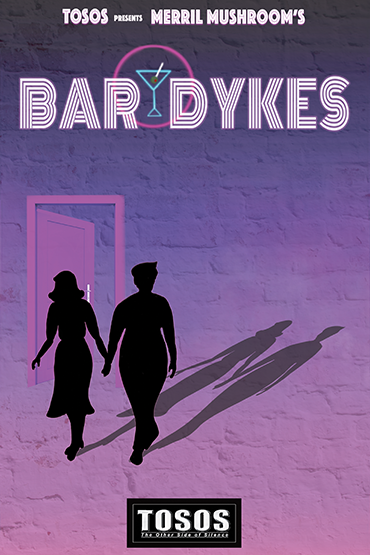Eleven dykes walk into a bar… the result is a must-see piece of theatre.
Playing through August 3 at The Flea in New York City, Merril Mushroom’s “Bar Dykes” is a time capsule to days and gays past. The immersive show, directed by Mark Finley and Virginia Baeta, invites the audience into 1950s bar culture, more familiar than not. Here, women come together to celebrate, commiserate, and escape the outside world.
The one-act, 50-minute play is being presented by The Other Side of Silence (TOSOS), the first professional gay theatre company in NYC. Around since 1974, it was created by Off-Off Broadway veteran Doric Wilson, cabaret star Billy Blackwell, and director Peter dell Valle with the intent “to deal openly and honestly with the gay experience.”
The company’s name feels fitting for the piece of theatre it is currently producing. In “Bar Dykes,” the characters go from the outside streets where they must blend and silently assimilate, to inside the bar, their sanctuary, home to their desires un-muted and unrestrained.
The unnamed bar is unremarkable: simple and inconspicuous, not looking to draw attention. A jukebox creates the show’s score, designed and compiled by Morry Campbell, and Ben Philipp and Rachel Muza, both of whom work on “The Marvelous Mrs. Maisel” have designed costumes that quickly categorize the patrons as butch, femme, or “KiKi.” Following conversations debunk that a bit—it’s so hard to tell these days, says the bar’s most decorated butch of a seemingly femme newcomer she’s cruising—but physical appearance plays an important role in these patrons’ lives, especially when they’re put in danger.
Mushroom stays mostly true to the dynamics of the culture in the 1950s. It’s, at its core, an observational piece, and the slang of the era is, thankfully, kept intact. Butches and studs (as this idyllic bar is actually integrated) pair with femmes, roles upheld with “deadly seriousness” during this time. Finley, Baeta, and TOSOS also have assembled a remarkable, passionate, and diverse cast to carry those roles. Though Moira Stone’s Bo, our soft butch bartender, serves as its axis (though the bar and era are, if anything, the starring roles), the whole ensemble drives the piece. Starring Amy Bizjak, Kiebpoli Calnek, Uré Egbuho, Alex Guhde, Brooke M. Haney, Azalea Lewis, Kimberly Singh, Stone, Angie Tennant, Emily Verla, and Jeanette Villafane, each character gets her moment. We catch small glimpses of what their lives look like in the outside world, but the important part is how they exist in their bubble. What life is like outside the bar doesn’t matter… until it does.
Mushroom wrote “Bar Dykes” back in the early 1980s, drawing on her experiences as a lesbian in the South (first Florida and then Tennessee) and in NYC pre-Stonewall. A respected elder, she’s talked about her experiences at length over the years, recounting the contradictions of the era and the fear that threaded it as the police raided gay bars and beaches.
“Sometimes, I’d be in one of my favorite nightclubs, dancing, conversing, or just sitting on my bar stool, when the music suddenly would stop and the lights would go on, signifying a police raid,” she recounts in Crooked Letter i: Coming Out in the South, speaking of life in Miami. “We’d immediately cease all same-sex contact of any kind and grab someone of the opposite sex to pretend we were with. The fear and tension was palpable, because one never really knew what the police might do.”
“Bar Dykes” is at home this year, the 50th anniversary of the Stonewall riots, a time to reflect and commemorate the people who got us here. In pre-Stonewall-set queer narratives, expecially those taking place at bars, you can unfortunately predict the ending, and sitting on the sidelines throughout the course of the show’s hour, like the characters you’re left waiting and anticipating the worst. When the worst comes, you can feel the air sucked out of the room, from our bar dykes and from the predominantly queer audience alike.
But that doesn’t mean it joins the long, long, long list of queer pain-centric pieces. “Bar Dykes” speaks to joy, love, lust, fear, and freedom. It makes you want to leave The Flea and head directly to Cubbyhole or Henrietta Hudson, or your similar sanctuary. The audience is witness to “undisturbed moments,” pure and intimate, no matter your vantage point: staring into the face of whichever woman is selecting at the jukebox, eavesdropping in on three friends who’d made the trip from Chicago, or tableside to some heavy cruising.
The fact that Mushroom wrote this piece, set in the ‘50s, in the ‘80s and that it still seems timely speaks to how far we’ve come and how far we have to go. It’s not a mistake you fit right in at this little bar. The only thing that has changed is in the language and the look; the feel remains the same.
###
“Bar Dykes” will run at The Flea Theater through August 3.


What Do You Think?